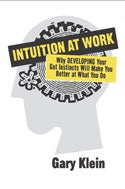
Intuition at Work: Why Developing Your Gut Instincts Will Make You Better at What You Do
By Gary Klein
Currency Doubleday, December 2002
322 pages, $26
The sound you hear in the background is that of the deans of the nation’s business schools gnashing their collective teeth.
Klein, a psychologist and noted researcher, has very carefully and methodically laid out a convincing case that can be boiled down to this: Trust your gut. Yes, skills, training and even education are helpful, but the most underused arrow in your management quiver may be your intuition.
“I define intuition as the way we translate our experience into action,” writes Klein, who heads his own consulting firm. “Our experience lets us recognize what is going on (making judgments) and how to react (making decisions). Because our experience enables us to recognize what to do … we don’t deliberately have to think through issues to arrive at good decisions [quickly].”
If making the case for instinct—based on his 20 years of studying everyone from executives to firefighters to Marines, and just about everyone else who has to make quick decisions daily—were all he did, this would be a worthwhile contribution. How many times have you felt compelled to produce data to back up a decision you “knew intuitively” was right? But Klein goes further.
If intuition isn’t mysterious but is instead a natural outgrowth of experience, then it should be possible to accelerate the process of gaining the necessary experience, he contends. He tries to do just that by laying out a framework that can help managers make better decisions:
• Build on your intuition. Deliberately put yourself in situations where you will gain more experience—both good and bad—that you can draw on the next time you have to make a decision.
• Mix intuition with reason. Combine intuition with effective analysis of the situations you face. Honing your analytical skills can only make applying your intuition more effective. The more complex and uncertain the task at hand, the harder it is to use intuition alone.
• Safeguard intuition from things that would make you question its value. Everything from skeptical bosses and colleagues to self-doubt can make you doubt your gut. One tactic: The more past successes you can point to, the easier it will be to get others to accept your intuitive beliefs, and the more confidence you will have in your own intuition.
To his credit, Klein takes pains to address what his theory is not. As everyone who has ever seen Star Wars knows, Klein points out, there are people who believe in what can only be described as mystical intuition. All they have to do is “use the force” to succeed. Klein’s theory doesn’t argue for that.
Klein is also painfully aware that some people will think his theory is too “touchy-feely.” So he spends a lot of time talking about the Marine Corps. The antithesis of a “feelings-based” organization, the Corps encourages and fosters “intuitive decision-making,” a must in the heat of battle.
Still skeptical? Take heart from the immortal words of Dr. Benjamin Spock, author of Baby and Child Care, the child-rearing bible. The book’s first sentence: “You know more than you think you do.”
Reviewed by Paul B. Brown, the author of 13 business books including the international bestseller Customers for Life: How to Turn That Onetime Buyer into a Lifetime Customer (written with Carl Sewell). A revised and expanded version has just been published by Doubleday.
